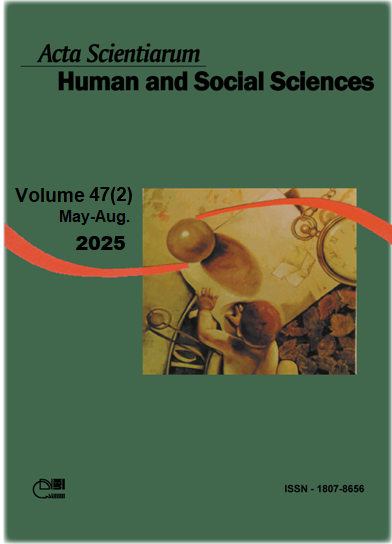Venezuelanos no Brasil: violências e não reconhecimento de direitos
Résumé
A tese central do artigo é que o não reconhecimento dos venezuelanos como refugiados, e o não reconhecimento por parte da Fundação Nacional dos Índios [FUNAI] dos povos Warao e Eñepá como indígenas, enfraquecem a garantia de seus direitos como cidadãos e cidadãs quando migram para o Brasil. Para tanto, realizamos uma análise da mobilidade migratória de venezuelanos para o Brasil, à luz do conceito de luta por reconhecimento (Honneth, 2003). O objetivo do artigo foi compreender a presença venezuelana no Brasil à luz do conceito de luta por reconhecimento e assim estabelecer uma compreensão da experiência migratória no Brasil. A metodologia utilizada foi revisão bibliográfica a partir de Honneth (2003) e Scott (2013) que trabalham com movimentos sociais, formas de resistência e suas lutas por reconhecimentos estabelecendo uma analogia com artigos científicos que tratam da trajetória dos venezuelanos no Brasil. O artigo conclui que os imigrantes venezuelanos vivem diariamente uma espiral de várias violências e de não reconhecimento de direitos básicos por parte do estado brasileiro. Com exceção do povo indigena Warao, não é observável por parte dos venezuelanos chegados ao Brasil qualquer forma de resistência ao tratamento dispensado aos mesmos pelas autoridades brasileiras, ao contrário, estes se colocaram à disposição das mesmas.
Téléchargements
Références
Referências
Alto Comissariado das Nações Unidas para os Refugiados [ACNUR]. (2021). Interiorização beneficia mais de 50 mil refugiados e migrantes da Venezuela no Brasil. https://www.acnur.org/portugues/2021/04/20/interiorizacao-beneficia-mais-de-50-mil-refugiados-e-migrantes-da-venezuela-no-brasil/
Brasil. (1988). Constituição da República Federativa do Brasil. Senado Federal.
Cirino, C. A. M. (2020). Índios, imigrantes e refugiados: os Warao e a proteção jurídica do Estado brasileiro Revista EntreRios, 3(2), 124-136 https://doi.org/10.26694/rer.v3i02.11028
Durães, M., & Junior, J. A.S. (2018). A crise imigratória na Venezuela e a impossibilidade do fechamento da fronteira entre Brasil e Venezuela na ótica do STF In R. Baeninger, & J. C. J. S. Sila (Coords.), Migrações venezuelanas (pp. 53-56). Núcleo de Estudos de População ‘Elza Bérquó’ - NEPO/Unicamp.
Edwards, A. (2015). Refugiado ou migrante? O ACNUR incentiva a usar o termo correto. ACNUR. https://www.acnur.org/br/noticias/comunicados-imprensa/refugiado-ou-migrante-o-acnur-incentiva-usar-o-termo-correto
Honneth, A. (2003). Luta por reconhecimento: a gramática moral dos conflitos sociais. Editora 39.
Magalhães, B. (2018). Dançando cirando com a lei: a Funai e a recepção de migrantes indígenas. In R. Baeninger, & J. C. J. S. Sila, (Coords.), Migrações venezuelanas (pp. 126-134). Núcleo de Estudos de População ‘Elza Bérquó’ - NEPO/Unicamp.
Marin, R., & Júnior, A. (2020). Migrantes, ‘refugiados venezuelanos’: conflitos e políticas de Estado. In: T. Reis, C. Souza, M. Oliveira, & A. Júnior, Coleção história do tempo presente - Volume II (E-book). UFRR.
Organização Internacional para as Migrações [OIM]. (2024, 31 de Out.). Migração venezuelana, Janeiro 2017 - Agosto 2024. https://brazil.iom.int/sites/g/files/tmzbdl1496/files/documents/2024-10/informe_migracao-venezuelana_ago24.pdf
Otero, G., Torrely, M., & Rodrigues, Y. (2018). A atuação da organização internacional para as migrações no apoio à gestão do fluxo migratório venezuelano no Brasil In R. Baeninger, & J. C. J. S. Sila (Coords.), Migrações venezuelanas (pp. 38-44). Núcleo de Estudos de População ‘Elza Bérquó’ - NEPO/Unicamp.
Rosa, M., & Quintero, P. (2020). Entre a Venezuela e o Brasil: algumas reflexões sobre as migrações Warao [Apresentação de trabalho]. Anais da 32ª Reunião Brasileira de Antropologia da Associação Brasileira de Antropologia, Rio de Janeiro, RJ.
Sarmento, G., & Rodrigues, F. (2018). Entre a acolhida e o rechaço: breves notas sobre a violência e os paradoxos da migração venezuelana para o Brasil. In R. Baeninger, & J. C. J. S. Sila (Coords.), Migrações venezuelanas (pp. 242-249). Núcleo de Estudos de População ‘Elza Bérquó’ - NEPO/Unicamp9.
Scott, J. C. (2013) Domination and the arts of resistance: hidden transcripts. Yale University Press.
Tarrow, S. (1998). Power in movement. Social movements and contentious politics. Cambridge University Press.
Truzzi, O., & Monsma, K. (2018). Sociologia das migrações: entre a compreensão do passado e os desafios do presente. Sociologias, 20(49), 18-23. https://doi.org/10.1590/15174522-02004901
Vedovato, L.R. (2018). Ação civil originária entre Venezuela e Brasil: a construção do direito de ingresso In R. Baeninger, & J. C. J. S. Sila, (Coords.), Migrações venezuelanas (pp. 45-52). Núcleo de Estudos de População ‘Elza Bérquó’ - NEPO/Unicamp.
Weiss, A. (2018). Tornar-se refugiado: uma abordagem de trajetória de vida para a migração sob coação. Sociologias, 20(49), 110-141. http://dx.doi.org/10.1590/15174522-02004904
Copyright (c) 2025 Filipe Ferreira, Vanda Pantoja

Ce travail est disponible sous la licence Creative Commons Attribution 4.0 International .
DECLARAÇÃO DE ORIGINALIDADE E DIREITOS AUTORAIS
Declaro que o presente artigo é original, não tendo sido submetido à publicação em qualquer outro periódico nacional ou internacional, quer seja em parte ou em sua totalidade.
Os direitos autorais pertencem exclusivamente aos autores. Os direitos de licenciamento utilizados pelo periódico é a licença Creative Commons Attribution 4.0 (CC BY 4.0): são permitidos o acompartilhamento (cópia e distribuição do material em qualqer meio ou formato) e adaptação (remix, transformação e criação de material a partir do conteúdo assim licenciado para quaisquer fins, inclusive comerciais.
Recomenda-se a leitura desse link para maiores informações sobre o tema: fornecimento de créditos e referências de forma correta, entre outros detalhes cruciais para uso adequado do material licenciado.


























